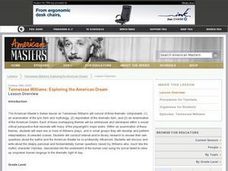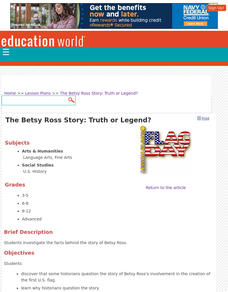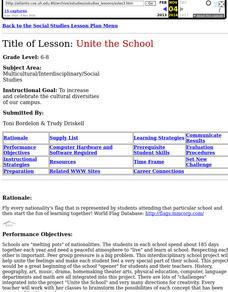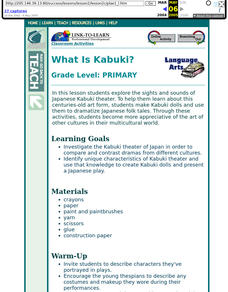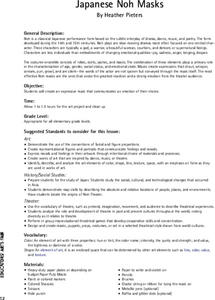Curated OER
Sophocles' Oedipus the King
Introduce your class to the Greek tragedy with a study of Sophocles’ Oedipus the King. Learners examine the features of a Greek tragedy, Sophocles’ achievements and contributions, and the universal themes that make the drama an enduring...
Curated OER
Southern Puritanism and Tennessee Williams
Pupils write an essay comparing Arthur Mille's The Crucible and one of Tennessee Williams' plays. In this Tennessee Williams lesson, students discuss the influence of Puritanism on modern American drama. Lesson includes a vocabulary...
Curated OER
Russia's Colony: Examining the Effects of Russian Colonization
Students respond to the question: How did Russian colonization effect Alaska's history? students examine environmental, cultural, economic, social and political impacts.
Curated OER
Tennessee Williams: Exploring the American Dream
High schoolers read and analyze selections of Tennessee Williams' work. They write journal responses, conduct Internet research, perform various scenes from one of Williams' dramas, and create a presentation.
Curated OER
Explore the Constitution
Students examine the U.S. Constitution. In this American history activity, students explore the founders' vision of U.S. government as they participate in readers' theatre, role-playing scenarios, and constitutional analysis activities.
Curated OER
James Whitcomb Riley
Students describe James Whitcomb Riley's poems and identify the themes they portray. In this poetry lesson plan, students read the history of James Whitcomb Riley and read some of his poems.
Curated OER
A Dash of Folk, A Pinch of Fairy Recipes for Playmaking
Students examine the importance of oral traditions while reading various fairy and folk tales. Given a piece of clay, they can mold it into any shape they want and pass it to their neighbor which keeps building the object. They use...
Curated OER
"War of the Worlds": A Broadcast Re-Creation
Why did Orson Welles' 1938 Broadcast of a adaptation of H.G. Wells' The War of the Worlds cause such a panic? To answer this question, class members listen to the original broadcast and research the panic that resulted. They then engage...
Curated OER
Henry V (Shakespeare) Introduction
Ninth graders identify current knowledge of dramatic literature and develop a schema for discussing an performing dramatic literature.
Curated OER
The Betsy Ross Story: Truth or Legend?
Young scholars discover that some historians question the story of Betsy Ross's involvement in the creation of the first U.S. flag, study why historians question the story and list reasons the story of Betsy Ross might not be true.
John F. Kennedy Center
Folktale Theatre
Introduce your middle schoolers to a performance and movement activity that uses their favorite stories from fairytales and folklore. They practice basic acting skills, create dialogues with a partner, and then as guided practice,...
Curated OER
Poetry Project
Choosing a poet or a theme, eighth graders conduct research in the world of poetry. They conduct Internet research and select five poems that fit their poet or theme, and create a seven slide PowerPoint presentation on their selected...
Curated OER
Arrow Word Search
In this social studies worksheet, students find the words that are related to the Athenian arrow and the answers are found through clicking the link at the bottom of the page.
Curated OER
Being in the Noh: An Introduction to Japanese Noh Plays
High schoolers read a Japanese Noh play and discuss its structure and traditional characters. They choose a short myth and write a Noh play based on it.
Curated OER
Unite The School
Students engage in a school project help unite the feelings and make each student feel a very special part of their school. This project would be a great beginning of the school "opener" for students and their teachers.
Curated OER
Walden the Ballad of Thoreau
Students role play to become familiar with the life of Thoreau. For this Thoreau lesson, students view a video of the Walden play about Thoreau. Students perform and promote the play as a school event.
Curated OER
Being in the Noh: An Introduction to Japanese Noh Plays
Students analyze the conventions used in Noh plays and write an introduction to a Noh play of their own. In this Noh play lesson, students identify the conventions of the Noh form and analyze the realizations the main character achieves....
Curated OER
Human Rights in the Philippines
Students examine the meaning of human rights under the United Nations system, in the U.S., and the Philippines. They conduct research, discuss the concepts in groups, and conduct a debate on the human rights situation post Marcos...
Curated OER
Theatre Prop Design and Construction
Fourth graders construct individual props. In this theatrical arts lesson, 4th graders use the elements of art to create various props using paper mache. Students construct objects such as logs, fruit, and a picture frame.
Curated OER
Classroom Conservation
Fourth graders suggest ways paper and other natural resources can be used and recycled in the classroom. Students conduct a investigation into paper use and make distinctions among observations, conclusions (inferences), and predictions.
Curated OER
Japanese Noh Masks
Students examine Japanese theatre and create their own face masks which display certain emotions, props, costumes and perform in improvisational theatrical games.





